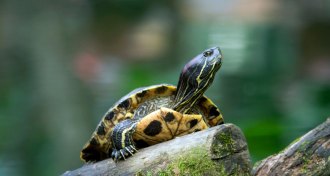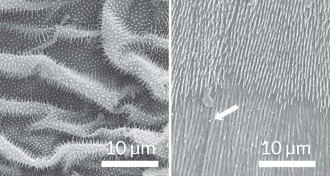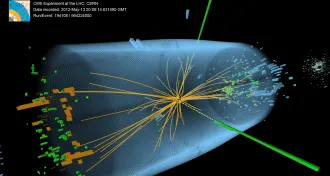Uncategorized
-
 Health & Medicine
Health & MedicineHighlights from annual meeting of infectious disease specialists
Heartburn pills increase risk of pneumonia, a better catheter and more were presented October 2-6, 2013 at ID Week in San Francisco.
By Nathan Seppa -
 Health & Medicine
Health & MedicineOld drug may have new trick
Parkinson’s medication helps mice with condition that mimics MS.
By Nathan Seppa -
 Climate
ClimateTropics to launch into uncharted climate territory by 2038
Global temperatures will take a permanent leap above historical bounds by 2047 if greenhouse gas emissions continue unabated, a simulation suggests.
-
 Chemistry
ChemistrySimulating reactions in cyberspace earns Nobel Prize in chemistry
Computer models that meld quantum and classical calculations have earned three scientists the 2013 Nobel Prize in chemistry.
By Science News -
 Animals
AnimalsHibernating turtles don’t slip into a coma
Winterized red-eared sliders shut down their lungs but spring into action when they see light.
By Susan Milius -
 Health & Medicine
Health & Medicine‘Decoding Annie Parker’ portrays hunt for breast cancer genes
Not long ago, most doctors scoffed at the idea of a “cancer gene,” as the new film shows.
-
 Animals
AnimalsLegless geckos slither using skin ridges
The animal's belly has flat rows of ripples that may help them wriggle.
By Meghan Rosen -
 Health & Medicine
Health & MedicineNorovirus vaccine shows early progress
Individuals immunized against Norwalk virus and another norovirus experienced less vomiting and diarrhea than those who didn't receive shots.
By Nathan Seppa -
 Physics
PhysicsProton-boron nuclear fusion returns to spotlight
A technique can fuse nuclei without producing harmful neutrons, but it is far from being power plant–ready.
By Andrew Grant -
 Science & Society
Science & Society2013 Nobels decades in the making
Prizes show that discovery takes inspiration plus perspiration.
-
 Particle Physics
Particle PhysicsHiggs field prediction lands Nobel Prize in physics
The famous particle’s detection last year confirmed the laureates’ 1964 proposal.
By Science News -
 Animals
AnimalsAlpine swifts fly nonstop for more than six months
During a journey of 200 days, the birds eat, rest and migrate without touching the ground.